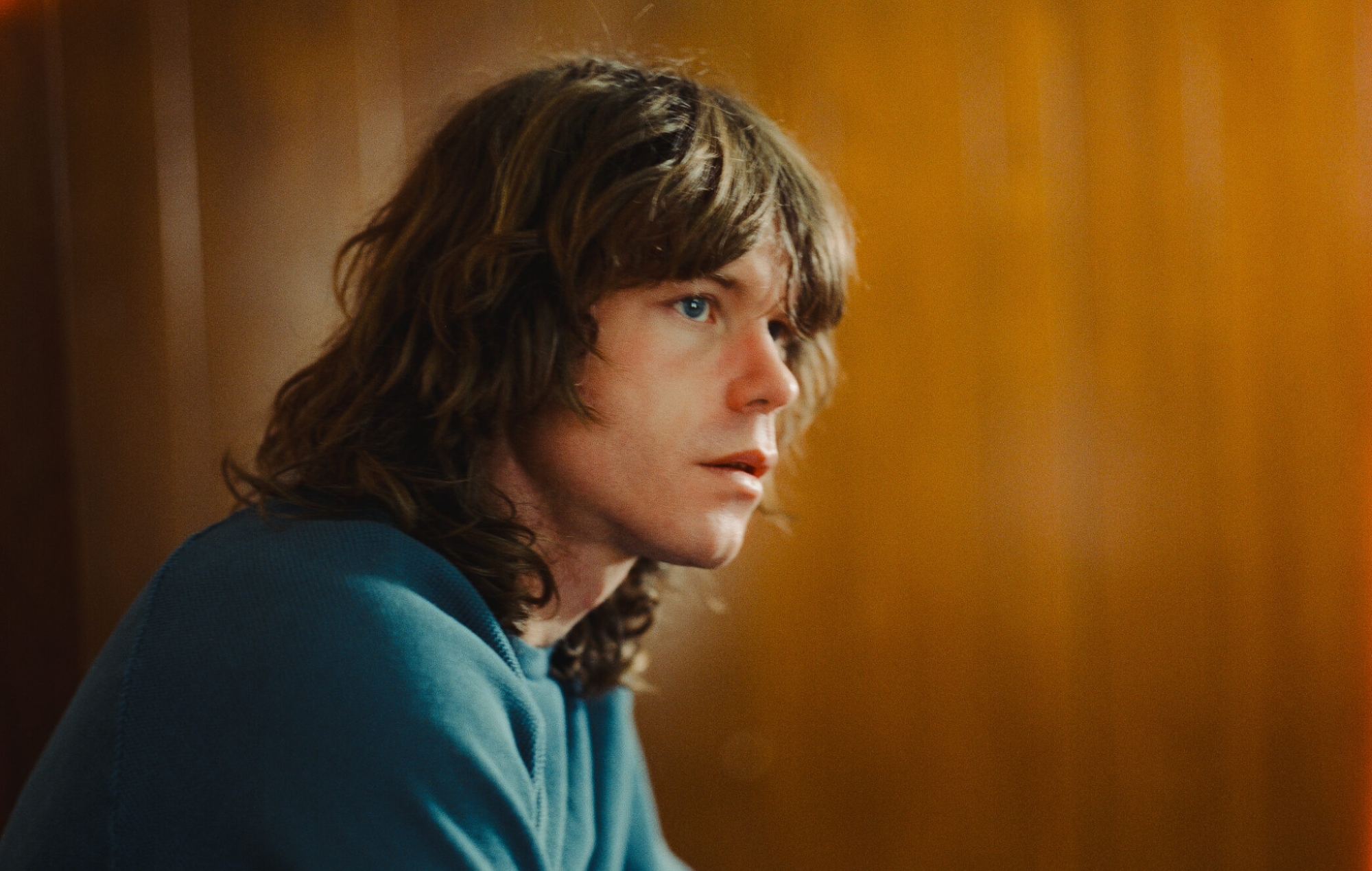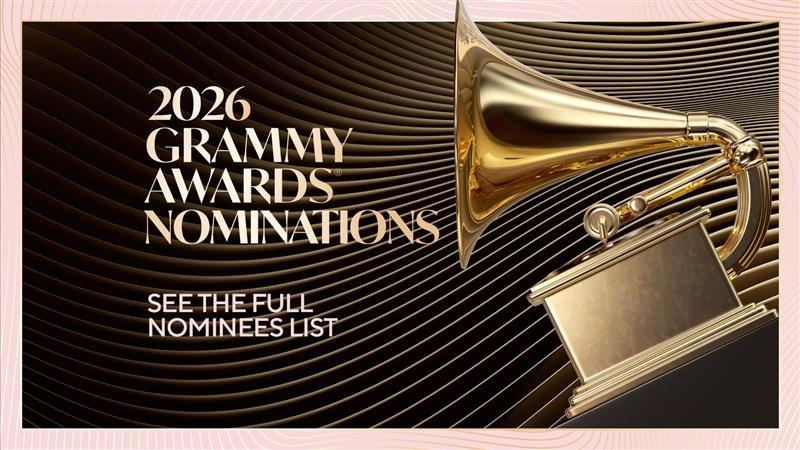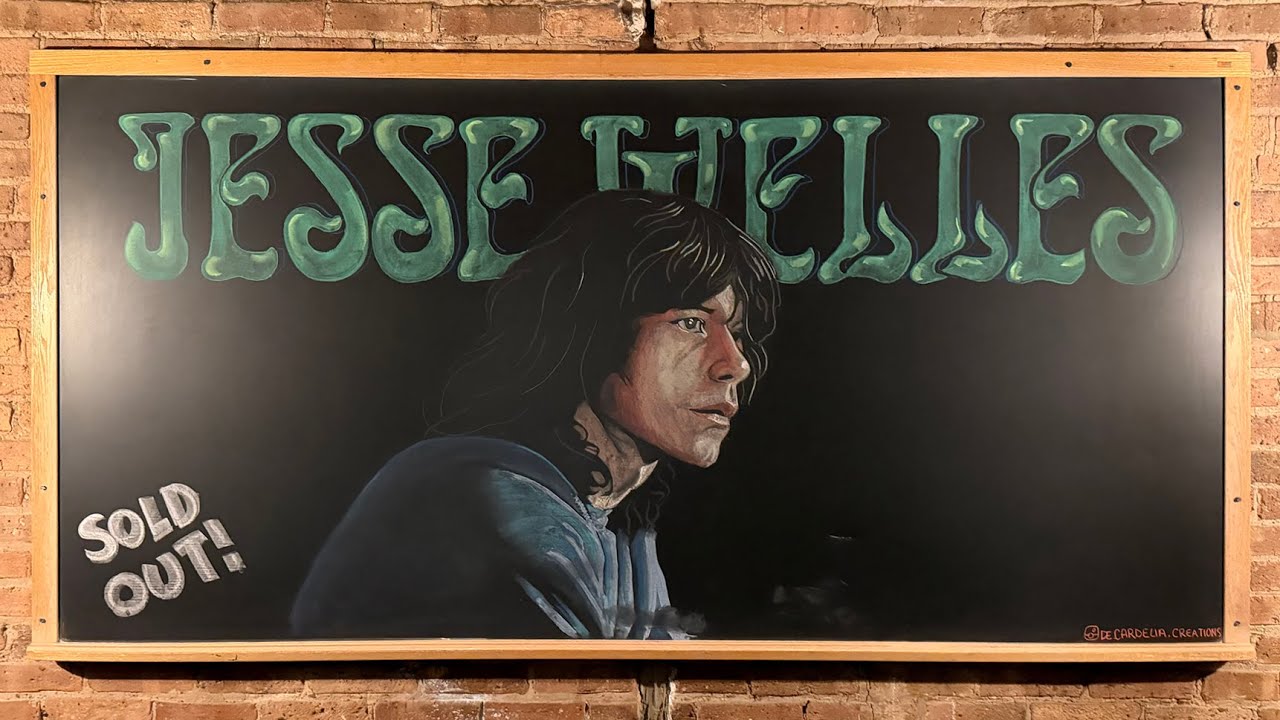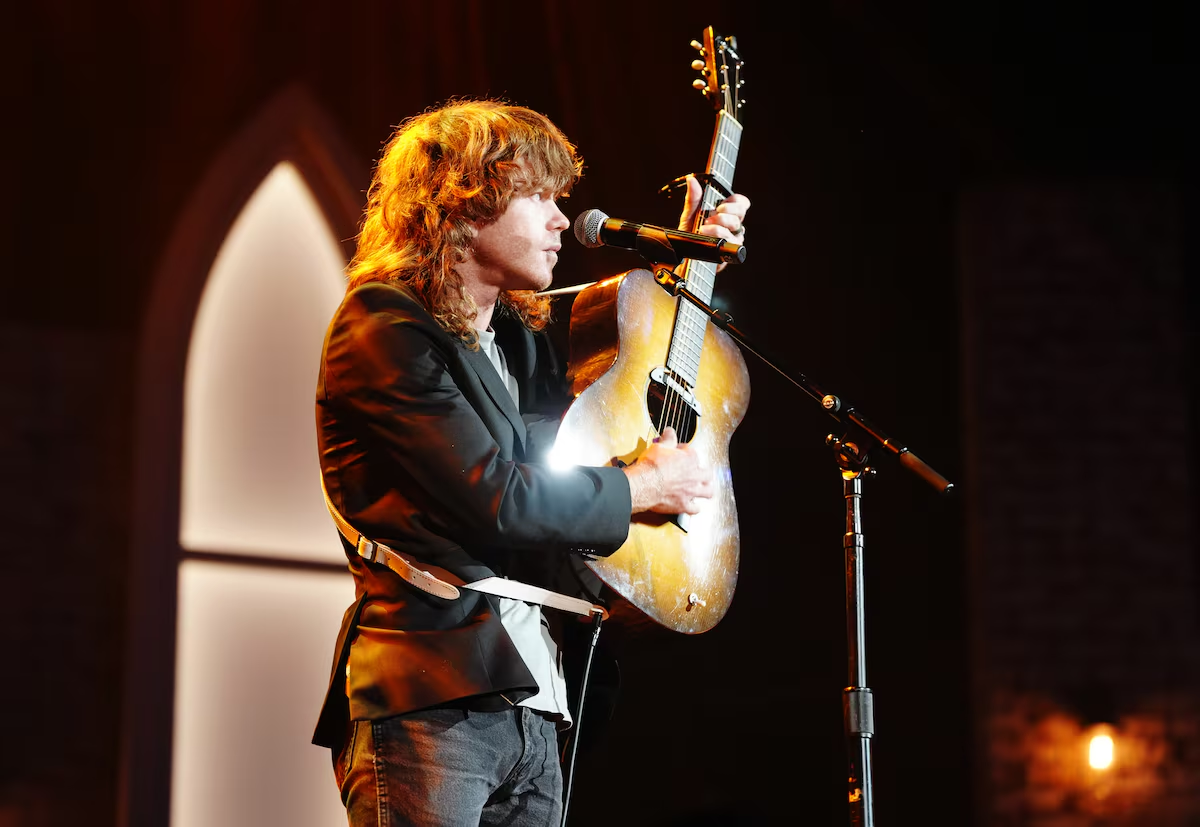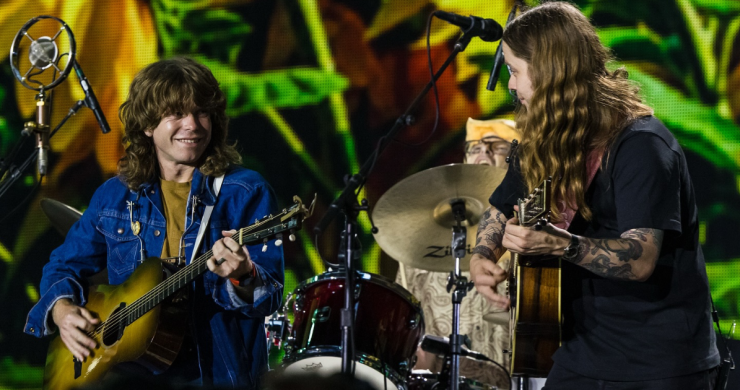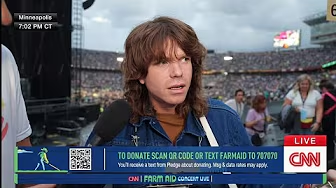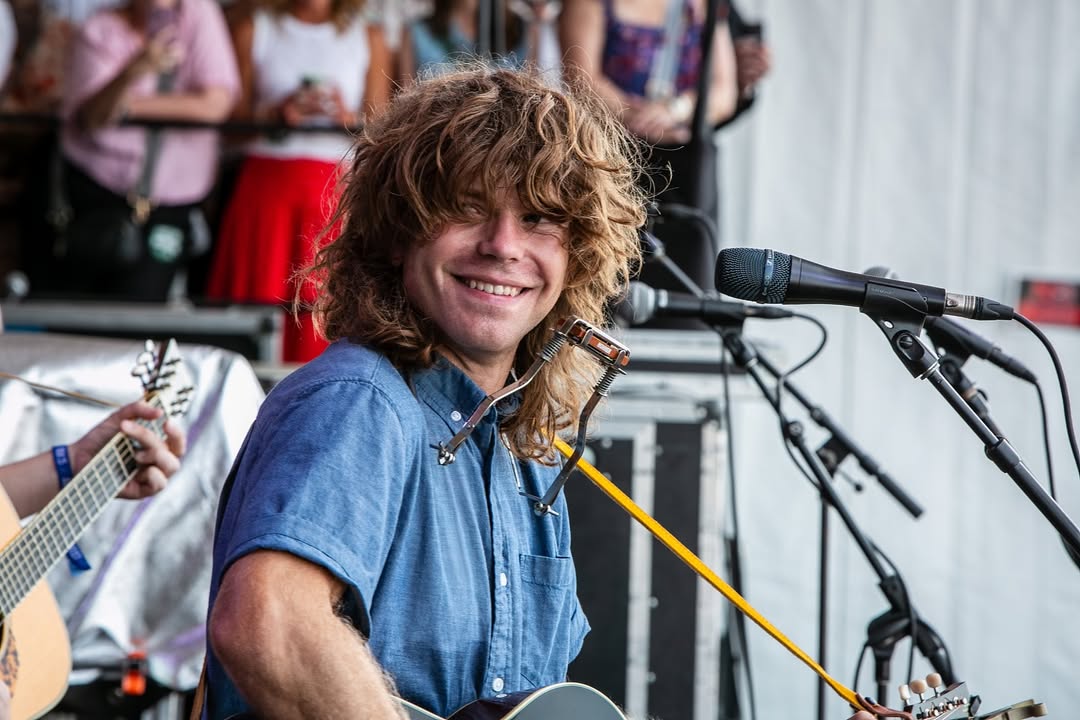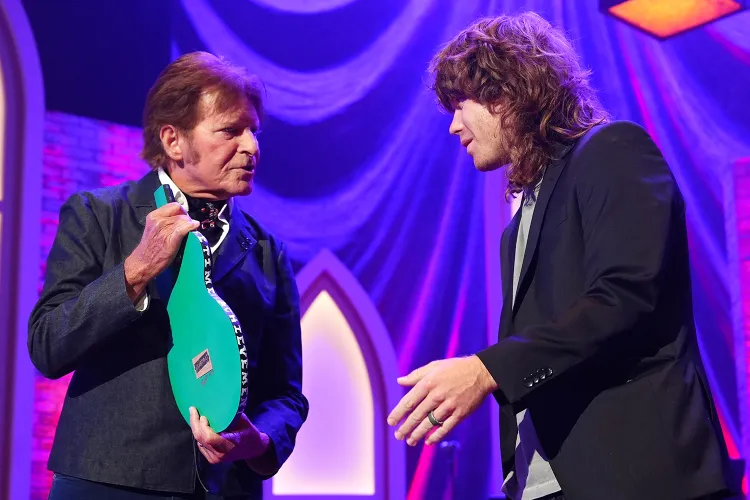The set-up for a typical Jesse Welles video is simple: the 32-year-old stands in an open field under a string of powerlines, clutching an acoustic guitar. From behind a tousled, curly mop of hair, he stares straight into the camera and starts singing.
“If you’re in need of a gig that’ll help you feel big, come with me and put some folks in detention,” he deadpans in one song, a scathing critique of Immigrations and Customs Enforcement. “We can sneak around town, hunting working folks down, I hear they get a great benefit plan.”
“Join ICE” is just one of the dozens of songs Welles routinely shares on social media. They’re often short and satirical tunes, riding on his coarse voice and fingerpicked guitar strings, that respond to the major headlines of the week. They challenge the narratives presented to Americans by governments and corporations; they draw historical parallels and unearth underlying tensions that lead people to blame one another for institutional injustices.
On the Internet, Jesse Welles’ songs are major hits. Thousands of people flock to the comments, calling him a modern day Bob Dylan or Woody Guthrie. Since he started regularly posting clips last year, Welles has amassed more than 3 million followers on TikTok and Instagram combined, not to mention his over 600,000 YouTube subscribers. The Recording Academy has also taken notice; last week, Welles received four Grammy nominations in the folk and Americana categories. He’s become one of the most visible examples of a new generation of digital-savvy artists bringing folk traditions to a modern medium.
“We’ve never been this informed,” Welles tells NPR about Americans today. “Pair being informed with being disempowered — being that aware and having so little hard influence on the aspects of your life that you’re so awake to. I think that explains a lot of people’s frustration.”
Welles wasn’t always a country-leaning singer-songwriter. He spent years playing in different iterations of rock bands, experimenting with folk and grunge. Nearly a decade ago, he signed to a label in Nashville, burnt out and went back home to Arkansas. In 2024, after his father suffered a heart attack, the now-independent artist says he had a spiritual awakening that put him on his current path. The songs began to pour out, some political and some not. So far, his music has addressed the war in Gaza, the Epstein list and the Trump administration’s claims that Tylenol is linked to autism.
[Tylenol]
Although Welles’ lyrics skew pro-working class and anti-violence, fans trying to neatly categorize his political affiliations might run into trouble. In August, he raised some eyebrows when he appeared on The Joe Rogan Experience. A month later, he released a song condemning the assassination of Charlie Kirk. It sparked both praise and backlash. On TikTok and Instagram, some people questioned how Welles could mourn a man who often made bigoted statements about minorities and helped elect the same politicians the singer criticizes in his lyrics. Welles says that for him, there’s no use in trying to control how people perceive him or how they attempt to project partisan lines onto his music. His bottom line, he says, is radical nonviolence.
“I visit a lot of different echo chambers. I pop in, pop out — see what’s going on in different corners,” Welles says. “You start to wonder, where’s the throughline? Because there’s obviously an issue, but neither corners’ justifications for their actions or reactions is really satisfying. So I think I just started looking for some sense.”
Audiences on and offline are right there with him. Welles released multiple studio albums this year, which include collaborations with rising Americana stars Sierra Ferrell and Billy Strings. He was awarded the 2025 John Prine Songwriting Fellowship and performed at both Newport Folk Festival and Farm Aid. He’s also been selling out shows across the country, where he’s been joined onstage by Joan Baez and John Fogerty. Welles’ success shows that his music is resonating widely, as a new generation of artists revive bold, plainspoken protest music for today’s digital age.
There’s a new generation of folk protest singers on TikTok
https://www.npr.org/2025/11/11/nx-s1-5600024/folk-protest-singers-jesse-welles-mon-rovia
Category: News

New Generation of Folk Protest Singers – NPR

Jesse Receives Four Grammy Nominations
- Best Americana Performance (cat 45) for Horses
- Best American Roots Song (cat 46) for Middle
- Best Americana Album (cat 47) for the album Middle
- Best Folk Album (cat 51) for Under The Powerlines April 24 – September 24
Category 45
Best Americana Performance
For new vocal or instrumental Americana performance. Award to the artist(s).
Boom
Sierra HullPoison In My Well
Maggie Rose & Grace PotterGodspeed
Mavis StaplesThat’s Gonna Leave A Mark
Molly TuttleHorses
2026 Grammys – Full Nominees List
Jesse Welles
https://www.grammy.com/news/2026-grammys-nominations-full-winners-nominees-listCategory 46
Best American Roots Song
A Songwriter(s) Award. Includes Americana, bluegrass, traditional blues, contemporary blues, folk or regional roots songs. A song is eligible if it was first released or if it first achieved prominence during the Eligibility Year. (Artist names appear in parentheses.) Singles or Tracks only.
Ancient Light
Sarah Jarosz, Aoife O’Donovan & Sara Watkins, songwriters (I’m With Her)BIG MONEY
Jon Batiste, Mike Elizondo & Steve McEwan, songwriters (Jon Batiste)Foxes In The Snow
Jason Isbell, songwriter (Jason Isbell)Middle
Jesse Welles, songwriter (Jesse Welles)Spitfire
2026 Grammys – Full Nominees List
Sierra Hull, songwriter (Sierra Hull)
https://www.grammy.com/news/2026-grammys-nominations-full-winners-nominees-listCategory 47
Best Americana Album
For albums containing greater than 75% playing time of new vocal or instrumental Americana recordings.
BIG MONEY
Jon BatisteBloom
Larkin PoeLast Leaf On The Tree
Willie NelsonSo Long Little Miss Sunshine
Molly TuttleMiddle
2026 Grammys – Full Nominees List
Jesse Welles
https://www.grammy.com/news/2026-grammys-nominations-full-winners-nominees-listCategory 51
Best Folk Album
For albums containing greater than 75% playing time of new vocal or instrumental folk recordings.
What Did The Blackbird Say To The Crow
Rhiannon Giddens & Justin RobinsonCrown Of Roses
Patty GriffinWild And Clear And Blue
I’m With HerFoxes In The Snow
Jason IsbellUnder The Powerlines April 24 – September 24
2026 Grammys – Full Nominees List
Jesse Welles
https://www.grammy.com/news/2026-grammys-nominations-full-winners-nominees-list
Live at Thalia Hall
Jesse Welles – Live at Thalia Hall – Chicago, IL – October 24, 2024
Band Members:
- Jesse Welles – Guitar, Harmonica and Vocals (@wellesmusic)
- Adam Meisterhans – Guitar (@meisterhansworld)
- Joel Parks – Bass and Vocals (@joelparks)
- Connor Streeter – Drums (@connor_streeter)
- Bobby Steinfeld – Keyboards (@bobbysteinfeld_)
JESSE SOLO SET 1
1. The List
2. Join ICE
3. Walmart
4. Whistle Boeing
5. Fentanyl
6. United Health
7. Cancer
8. The PoorFULL BAND SET 1
9. Domestic Error
10. Red
11. The Great Caucasian God
12. Philanthropist
13. War is a God
14. Certain
15. Change Is in the Air
16. Rocket ManJESSE SOLO SET 2
17. Wild Onions
18. Let It Be Me
19. Turtles
20. Gilgamesh
21. Knockin’ on Heaven’s Door (Bob Dylan cover)
22. Middle
23. Bugs
24. That Can’t Be RightFULL BAND SET 2
25. The Whales
26. Heart-Shaped Box (Nirvana cover)
27. Malaise
28. It Don’t Come Easy
29. Horses
30. Have You Ever Seen the Rain? (Creedence Clearwater Revival cover)
31. Wheel
32. Fear is the Mind KillerENCORE
33. War Isn’t Murder

Power of Jesse Welles
The Divisive Power of Jesse Welles
The folk singer will be at the Ogden for a two-night run.
Some music critics, like Steven Hyden, really don’t like Americana singer-songwriter Jesse Welles. “It’s all just a pile-up of performatively plain-spoken words over a fourth-rate Woody Guthrie guitar strum, over and over,” Hyden wrote in an anti-Welles manifesto last month.
Some hard-liners really don’t like Welles because of “Charlie,” his gentle folk song released the day after right-wing personality Charlie Kirk was murdered. “No one should get killed / no blood should be spilled” seems like a sentiment we can all agree on, but these are polarizing times. And after about a decade as an underground rocker, Welles has become famous as a folk artist in the last couple of years by taking musical cannonballs into polarizing issues.
Welles — a babyfaced, shaggy-haired, 32-year-old Arkansas native whose life was changed as a Southern teenager by discovering Aldous Huxley and Allen Ginsberg — has released three albums this year and drops news-savvy songs (“Tylenol,” “Join ICE,” etc.) on YouTube constantly, often in videos showing him looking directly into a smartphone from a wooded area near some powerlines. It’s not unexpected that some journalists, musicians and proponents of cancel culture hate Welles for going viral by finding a niche, but it is surprising as well as uplifting that young people have discovered what used to be called protest music through the singer, whose palette includes the sweetness and humor of John Prine and the attitude of someone who grew up on grunge.
“It’s good to hear that some pacifist groups have picked up on ‘War Isn’t Murder,’” Welles says. “That’s good. The things that we can meet on the Venn diagram, I think, are some of the most enjoyable. I see a lot of sons and mothers and fathers at my shows, and I think that is so important to start to heal the generational wound, you know? The last thing they could really divide us up by was by generation, and they’ve managed to with flying colors. It’s going to be very important moving forward, as just humanity moving forward, to be able to have the generations become friends again.”
Welles will headline sold-out shows at the Ogden Theatre on October 29 and 30. He says he’s developed a good relationship with Colorado over the years, initially as Jeh Sea Wells, fronting numerous garage-style bands, and now as an overnight sensation and torchbearer for antifascist protest music that goes back to Woody Guthrie.
“Colorado is ‘The West’ to me,” Welles says. “It’s all good until I try to play my harmonica, and then I can’t really breathe, being from a river valley. When I was nineteen, me and my buddy went and camped in Rocky Mountain National Park for about a week and just hiked and camped and wrote tunes and stuff. I had the Ginsberg collected poems, the big red book. I was just out there pretending to be some kind of Beatnik, I suppose. It was those Beats that had romanticized Denver to me.”
Welles says that Howl, the Tao Te Ching, J.D. Salinger and Walt Whitman knocked his doors off as a teenager, benefiting from “isolation, maybe a lack of technology, just going to the library and exploring, just being weird. I was just a weird kid, you know? I wasn’t concerned with the things that other kids my age were concerned with.”
Today, Welles — who played Farm Aid 40 last month in Minneapolis with Willie Nelson, Neil Young and others on his political wavelength — isn’t concerned if kids, or even adult fans, don’t get the overarching messages of such songs as “War Isn’t Murder” or “Amazon Santa Claus” and just enjoy the music.
“As far as people digging it for the guitar or whatever, it’s like if someone was using the Tao Te Ching as a doorstop, and in that respect, they’re getting a practical use out of it,” he says. “So where’s the harm in that? It’s there. If someone were to come to the house and remove the doorstop to read it someday, then it would have served two purposes. There are songs that I’ve listened to my entire life that I probably didn’t really understand until last year, you know? You come back to it and have a whole new understanding of it. If you’re listening at all, that’s just a wonderful thing.”
On the other hand, being from the deep South, Welles — with songs like “The Great Caucasian God” and “Starve Away” — sometimes has a problem similar to that of Randy Newman’s plight with his satirical anthem “Rednecks,” which some racists ran with as a genuinely bigoted song they could grab hold of and get down with.
“I come home and people — some folks — don’t get the joke,” Welles explains. “Some folks think that if you worked a little harder, then you’d have a lot more, or that it’s your own damn fault you’re so damn fat. They listen to those tunes and they take them at face value and they go, ‘Hey man, I love you.’ But it surprises me in Arkansas, how many folks will come up and genuinely like it, appreciate the message, and in that you become aware of this big silent middle. More of us want peace than the news would have you believe.”
Welles brought out a full band for part of his Farm Aid set, lending a Bob-Dylan-at-Newport explosiveness to his otherwise stripped-down folk songs, and he’s released some recordings with the band and brought them along on his current tour. On top of his busy life churning out new music constantly, along with performing, he’s an avid runner who completed a marathon recently and says he gets a lot of the news that informs his songs by listening to “news programs from all over.”
“I’ll pay attention to what is going on, on things like Threads and X, but sometimes I have trouble finding a kind of middle ground or less intense view, looking at either of those platforms,” he says. “That’s where it can get overwhelming, if you’re taking everything in off social media. It doesn’t drag me down, or I’m so dragged down I don’t even realize how down I am. I think I’m okay.”
The Divisive Power of Jesse Welles, Adam Perry, October 24, 2025
https://www.westword.com/music/the-divisive-power-of-jesse-welles-40796092/
Welles Determined Not To Be Yesterday’s News
Protest singer Jesse Welles is determined not to be yesterday’s news
In the 2020 drama News of the World, Tom Hanks plays an itinerant soul eking out a living travelling the post-Civil War West, reading newspapers aloud to crowds. The monologues not only provided information but also amusement, even if the news concerned calamities.
“See all those words printed in a line one after the other? Put ’em all together and you have a story,” Hanks’s grizzled news aggregator explains.
The protest singer Jesse Welles offers much the same proposition in 2025, but with songs. With his raspy voice, impressive mane of hair and tuneful sloganeering inspired by the front pages, the 32-year-old Arkansan has struck a populist chord in the internet age.
What he calls “field recordings” are just that – simple smartphone videos for social media consumption, of him and an acoustic guitar in a woodsy setting railing against soulless corporate retailing (Walmart) or music industry greed (Payola). Welles responded to the murder of insurance executive Brian Thompson in 2024 with United Health, a satirical 86-second ditty with a melodic lope: “Commoditized health, monopolized fraud / There’s doctors that we own, and research that we’ve bought…”
Welles’s transformation from an unknown indie rocker to Gen Y’s Woody Guthrie was more or less overnight. He says he came to an epiphany after his father suffered a heart attack.
“It really stuck with me just how short life is,” Welles told The Globe and Mail earlier this month on a video call from his home in Siloam Springs, Ark. “We all go, and I didn’t want to be lying there and be preoccupied with the feeling that I’ve lived an unfulfilled life.”
One morning early last year, Welles got out of bed and wrote War Isn’t Murder, a reaction to the Israel-Hamas war that rhymed “Netanyahu” with “a bomb for you.”
Since April 18, 2024, the song’s video has racked up more than two million YouTube views. The tune represents a flash philosophical awakening and songwriting turnabout.
“I had woken up to everything that was going around me,” Welles recalled. “What you’re hearing in War Isn’t Murder is my own shock.”
The son of a mechanic father and a schoolteacher mother was born Jesse Allen Breckenridge Wells. He previously released music under the name Jeh-sea Wells and later, with his band Welles, whose grungy, psychedelic debut album Red Trees and White Trashes from 2018arrived with a young man’s unsophisticated sentiments: “So give me all the drugs / Cover me in blood / It’s all I need / Rock and roll.”
Turns out, rock ‘n’ roll did not need him. Welles added the “e” to his name, shaved his beard and eventually reinvented himself as a hot-button-topic troubadour. He plays a sold-out Danforth Music Hall in Toronto on Saturday, with future full houses at the city’s Massey Hall and Vancouver’s Commodore Ballroom already on the itinerary for next March.
An article in Rolling Stone magazine asked, “Can Jesse Welles revive the protest song?” Despite Welles’s success in the medium so far, there are signs the revival might not take.
Country star and U.S. Navy veteran Zach Bryan recently posted a snippet of his forthcoming topical song Bad News, which included lyrics critical of U.S. Immigration and Customs Enforcement. When the song received a polarized response, Bryan backed away from the controversy faster than a pickup truck after a honky-tonk’s last call.
“I served this country, I love this country and the song itself is about all of us coming out of this divided space,” Bryan wrote on Instagram, saying he was “just as confused as everyone else.”
The Dust Bowl balladeer Guthrie once painted the words “This machine kills fascists” on his guitar. Bryan’s “Just as confused as everyone else” doesn’t have the same ring to it.
For his part, Welles realizes his quick-hit singles The Olympics (about the Trump-Biden debate) and the doleful ballad Charlie (about slain right-wing commentator Charlie Kirk) won’t stand the test of time.
“Why would anyone read last month’s newspaper?” he said.
(Of course, classic protest songs such as Bob Dylan’s Hurricane or Neil Young’s Ohio transcended the news cycle.)
On a flurry of albums released this year, Welles continues to include songs that react to the current era, even if they don’t have a viral-hit impact: Will the Computer Love the Sunset (from Pilgrim), Horses (“All my flannels made in Bangladesh / All my T-shirts in Vietnam,” off Middle), and America, Girl (from Devil’s Den).
Asked last month by Rolling Stone about how he voted in the last election, Welles declined to comment. Speaking to The Globe, he stayed clear of left and right.
“So many of us are politically orphaned and have not been politically and ideologically represented in 30 or 40 years,” he explained. “My generation has voted and voted, and only seen the American dream get further and further away from them, no matter who was in office.”
Protest singer Jesse Welles is determined not to be yesterday’s news, Brad Wheeler, October 15, 2025
https://www.theglobeandmail.com/culture/music/article-jesse-welles-protest-singer/
Live for Live Music Highlights Jesse Welles at Farm Aid 40
Farm Aid 40 Unites Generations Of Artists: Willie Nelson, Bob Dylan, Billy Strings, Jesse Welles, More
For four decades, Farm Aid has stood as both a concert and a cause. Founded in 1985 at the height of the farm crisis, the benefit has helped support America’s family farmers through recessions, droughts, and floods, reminding us year after year that music is not just entertainment but a catalyst for solidarity and social change. On Saturday, that legacy was renewed as 37,000 fans filled Huntington Bank Stadium in Minneapolis for Farm Aid’s 40th anniversary.
The milestone arrived at a critical moment, as U.S. farmers once again face mounting economic challenges. With crop prices falling and bankruptcies on the rise, the sense of crisis is eerily similar to the conditions that first inspired Willie Nelson, Neil Young, and John Mellencamp to launch Farm Aid.
The all-star lineup reflected Farm Aid’s balance of tradition and progress, featuring co-founders Nelson, Young, and Mellencamp alongside fellow board members Dave Matthews and Margo Price, the youngest addition to the organization’s leadership. They were joined by a diverse roster including Bob Dylan, Billy Strings, Kenny Chesney, Steve Earle, Lukas Nelson, Wynonna Judd, Nathaniel Rateliff & The Night Sweats, Trampled by Turtles, Waxahatchee, Eric Burton of Black Pumas, Jesse Welles, and Madeline Edwards.
Throughout the day, collaborations amplified the event’s spirit of solidarity. Lukas Nelson teamed up with Dave Matthews on Daniel Lanois’ “The Maker” and welcomed Sierra Ferrell for a string of duets including Neil Young’s “Unknown Legend”. Dave Matthews & Tim Reynolds enlisted fiddler Jake Simpson from Lukas Nelson’s band, while Billy Strings and Jesse Welles joined Price for a fiery take on Dylan’s “Maggie’s Farm”.
Welles and fellow newcomer Madeline Edwards, at 32 and 29 respectively, underscored Farm Aid’s generational reach. Edwards impressed early in the afternoon with a soulful set that positioned her as one of the day’s breakout stars. Welles’ set, meanwhile, cut sharp with commentary-laced originals like “The Poor” and “Red”. He cheekily dedicated his song “Philanthropist” to Bill Gates “and the millions of acres of farm land that he’s stolen from the good people of America,” before closing on a lighter note with “Bugs”.
Price, who received her introduction from Sen. Amy Klobuchar, opened with the defiant anthem “Don’t Let the Bastards Get You Down”, the last song performed on Jimmy Kimmel Live! before the host’s controversial suspension. Steve Earle, newly inducted into the Grand Ole Opry, bookended Nathaniel Rateliff & The Night Sweats with two appearances, cementing his role as elder statesman, while Wynonna Judd, Eric Burton, Trampled by Turtles, and Waxahatchee each brought distinct flavors to the nearly 12-hour program.
As always, the concert’s final moments carried the greatest weight. Nelson, Young, Mellencamp, Matthews, Price, and the entire Farm Aid family (save for Dylan) gathered for a heartfelt finale of “Will the Circle Be Unbroken?”, “It’s Hard to Be Humble”, and “I Saw the Light”. Gov. Tim Walz introduced Nelson by praising him as “a man who truly embodies the American spirit—fiercely independent, generous, kind, irreverent, decent, and a bit of a hell-raiser.”
Forty years on, that spirit remains intact, and so does Farm Aid’s mission. “Don’t believe it when they tell you we ain’t in it together,” Dave Matthews told the crowd, reminding them that the challenges facing farmers are shared struggles. As Neil Young indicated during a press conference where he argued Minnesota-based Cargill and other corporations “need to pay a conscience tax to the farmers of America,” the fight is far from over. Yet for one night in Minneapolis, thousands proved that through music, community, and conviction, the circle indeed remains unbroken.
Watch the entire Farm Aid 40 webcast below and click here to donate to the cause.
Farm Aid 40 Unites Generations Of Artists: Willie Nelson, Bob Dylan, Billy Strings, Jesse Welles, More, By James Sissler, September 21st, 2025
https://liveforlivemusic.com/news/farm-aid-40-unites-generations/
Jesse Welles Interview on CNN at FarmAid 2025
John Berman: Bill, I know you have a special guest, someone who performed earlier in the day.
Bill Weir: That’s right, John. It’s rare to be scrolling through your feeds and find what you think may be the next Bob Dylan. Uh, that is definitely the case. I’m not singular in that observation. Many other people have had that, which is why Jesse Wells just played his first stadium. Uh, this talent out of Ozark, Arkansas. Good to meet you, Jesse.
Jesse Welles: Hey, good to meet you. Yeah.
Bill: You like the Dylan comparisons? What do you think of that
Jesse: Sure. All right. You know, that’s flattering. The shoes are too big to fill. But, you know, I think people just grab the closest thing they’ve ever seen to it and and uh that’s the comparison they draw.
Bill: Well, in addition to your music, which I love, and your voice I love, you are continuing this tradition of voices of conscience. You write songs about the war in Gaza and about United Healthcare. You wrote a song after the Charlie Cook assassination. It was very poignant. What is it that makes you lean in, while plenty of artists would rather avoid politics altotogether?
Jesse: Uh years things have gone down. I haven’t seen anyone really talk about it. Not to say that they’re not out there or whatever, but I just I myself hadn’t really seen it. It seemed like a vacuum there. And uh I woke up one day and reckoned, well I’d talk about it. Yeah. I got nothing to lose.
Bill: So that’s what is the what is generally the response? I imagine some people, like fans of folk music and protest bands through the years appreciate it. Do you get any push back? Do you get in these politically charged times?
Jesse: They might push back, I suppose. I don’t much look but the main point is to make a place for people to have a conversation about just what is the crux of the problem. That’s you’re kind of you’re fostering or facilitating a place for people to have a discussion with a tune.
Bill: You know, I could see faces lightening up as your lyrics landed in the daytime set earlier today. What is your writing process? Is it that you you absorb the news and it just comes out or can you talk about that?
Jesse: Oh, I just I’m just always writing. I’m just always writing. So, if I get a good rhyme, then that one will be a tune, you know. Yeah, sometimes the rhymes ain’t even that great, they still become tunes, you know.
Bill: Well, Bugs is a favorite with my 5-year-old son.
Jesse: Yeah, I like Bugs.
Bill: And I’m coming to Webster Hall to see you. So, congrats on your first stadium set. And this is the beginning of a long important career, I hope, for you.
Jesse: I appreciate that. I can’t wait to see you. Webster Hall will be a lot of fun. So, yeah.
Bill: I’ll see you there. Jesse Wells, everybody out of Ozark, Arkansas. Just one of an amazing— Look at this. There’s some real appreciation, across the demographics.

Jesse Welles feature NPR Weekend Edition
SCOTT SIMON, HOST:
Farm Aid will hold its 40th annual concert later today in Minneapolis. The nonprofit was founded by musicians Willie Nelson, Neil Young and John Cougar Mellencamp back in 1985 to support family farms across America. One of the newer voices taking to the stage this year is Jesse Welles, a musician whose social media posts have attracted a large online following. Minnesota Public Radio’s Clay Masters has this profile.
CLAY MASTERS, BYLINE: Farm Aid was pretty surreal for Jesse Welles last year. He got an email from John Mellencamp asking him to play, that Welles says he had to vet to make sure it was real. When he showed up to the gig, Dave Matthews rushed up to him.
JESSE WELLES: And he said, my name is David Matthews. I’m a very, very big fan of everything that you’re doing. And the whole time I’m just thinking, you’re not David. You’re – this is – you’re Dave Matthews, man (laughter).
MASTERS: Matthews introduced him on stage at last year’s Farm Aid in New York State.
(SOUNDBITE OF ARCHIVED RECORDING)
DAVE MATTHEWS: I think he’s one of the best songwriters I’ve ever heard in my life. And he’s prolific, and he’s young and he gives me hope, and he’s unbelievable.
MASTERS: Welles has garnered a large following for songs he’s written quickly about current events and then posted online, just him standing in a field, singing and playing his guitar.
(SOUNDBITE OF SONG, “WAR ISN’T MURDER“)
WELLES: (Singing) War isn’t murder. Good men don’t die. Children don’t starve, and all the women survive. War isn’t murder.
MASTERS: Welles is 32 years old and had fronted rock bands since he was a kid. He was living in Nashville for a short while but moved back home to Arkansas after his dad had a heart attack last year. Welles says he was considering hanging up music.
WELLES: In the face of that potential death, I thought we don’t have very long. I can repurpose this craft that I’ve been working on all these years, and I’ll sing the news. I’ll sing the state of affairs.
MASTERS: “War Isn’t Murder” was the first song he posted in this style, a song about countries minimizing casualties during wartime. It was posted when people were protesting Israel’s war in Gaza on college campuses.
(SOUNDBITE OF SONG, “WAR ISN’T MURDER“)
WELLES: (Singing) That’s what they say. When you’re fighting the devil, murder’s OK. War isn’t murder. They’re called casualties. There ain’t a veteran with a good night’s sleep. Let’s talk about dead people.
MASTERS: The song has more than 2 million views online.
WELLES: All you must do is write your tune and play it to your phone and let the public be the judge of your craft.
MASTERS: This one was posted after a Boeing whistleblower who raised concerns about defects with the company’s 737 Max jets died of an infection.
(SOUNDBITE OF SONG, “WHISTLE BOEING“)
WELLES: (Singing) You can know a lot. You can know a little. But whatever you know, just don’t blow the whistle. You can toot a flute. You can play the fiddle. But whatever you do, just don’t blow the whistle.
MASTERS: Musician and Farm Aid board member Margo Price says Welles is a needed voice in music.
MARGO PRICE: He has such a penchant for really documenting the times and doing it in a poetic way. We need more voices like that.
MASTERS: In “Domestic Error,” he sings about the country’s troubled times.
(SOUNDBITE OF SONG, “DOMESTIC ERROR”)
WELLES: (Singing) If I ever want to see that flag up high, I’m going to have to cut the pole in half. ‘Cause most of the time, most of our lives, it’s been flying down at half-mast. Hotels, casinos and spaceships, Teslas and tunnels are fine. Folks get too close to the big White House, and they lose their [expletive] minds.
MASTERS: As for his songwriting craft, Welles says the lyrics usually dictate the sound of his songs.
WELLES: Once you put a line to a melody, in a way, something alchemical happens, and you won’t necessarily be able to change the melody after that. After that first hearing, you are, in a way, tattooed.
MASTERS: Here in this song, he’s critical of the baby boomer generation.
(SOUNDBITE OF SONG, “THE GREAT CAUCASIAN GOD“)
WELLES: (Singing) There is a foolish generation, squandered all their father’s pay. They are running out of time left to enjoy. They would kill and eat their own if the TV told them so. So they’re keen to watch the world burn just to make a point.
MASTERS: Organizers of Farm Aid say Welles is a great addition to the lineup of artists, as many of their festivalgoers have become concerned about corporate power and consolidation. It’s true to Farm Aid’s mission of not only helping farmers but also using music to amplify its message these last four decades.
For NPR News, I’m Clay Masters in Minneapolis.
(SOUNDBITE OF SONG, “THE GREAT CAUCASIAN GOD“)
WELLES: (Singing) Does not the Lord abide in Texas, and in Waco and the rest of every Israel that hubris ever claimed? Does the Lord abide in prisons full of men with holy visions? Don’t the Lord abide in every tent and…
https://www.npr.org/2025/09/20/nx-s1-5521947/farm-aid-celebrates-its-40th-anniversary-with-a-benefit-concert-in-minneapolis
Farm Aid Bio
From the middle ages up to the modern era, society has leaned on its traveling troubadours for truthful commentary on the times. These folks trek from one town to the next, relaying the news, putting pain into words and healing with a little humor.
Jesse Welles unassumingly upholds and continues this tradition. Fearless, he reports from the frontlines of a divided country on the brink, addressing inequalities and injustices, cutting through all bullshit and driving directly to the source of the matter. His songs leave the same mark in front of a sold-out club as they do under the unbiased eye of a smartphone camera as he strums his guitar alone in the wilderness of Arkansas.
Following tens of millions of streams and a groundswell of acclaim from Rolling Stone, the New York Times and more, the singer, songwriter and guitar player cuts deep on his 2025 full-length album “Middle.”
“Breathe to write, write to breathe,” he says. “Humans are meant to create, so I’m gonna create music and keep releasing it constantly.”
Jesse calls Ozark, Arkansas, home. You might’ve caught a glimpse of Ozark on the HBO documentary Meth Storm or in Paris Hilton’s reality television show Simple Life, but neither do it justice. With a population of 3,590, it’s a place where most families reside down dirt roads. The town consists of a turkey plant, an engine plant, a gas station or two and a handful of restaurants.
Growing up, his father worked as a mechanic, and his mom as a school teacher. Early on, his grandpa copied The Beatles’ White Album and Sgt. Pepper’s Lonely Hearts Club Band for Jesse. Those cassettes would become the soundtrack to endless hours of bike rides and treks through the woods, long bus rides to and from school, and walks to the library. At 12-years-old, he finally scrounged up enough to dough for a “$56 first act guitar from Walmart.” It became like another limb to the boy. Bringing the guitar everywhere, he played along to the radio, studied “what the grownups did” during impromptu jam sessions at parties and gleaned nuggets of wisdom from local old-timers. He fed his obsession by checking CDs out of the public library and ripping them to the family computer, embracing classics from Bob Dylan, Joni Mitchell, Joan Baez and Woody Guthrie. He experienced another revelation “as soon as YouTube made its way to Arkansas.”
“Once somebody showed me Led Zeppelin and Black Sabbath, I was fucked,” he laughs. “We had waited like 10 years for our library to get the internet. Then, the old Pentecostal women who worked there wouldn’t let me plug in my headphones!”
Not one to take such news lightly, he actually wrote a letter to the Franklin County Seat and received permission to return to the library (with headphones in tow). Throughout high school, he balanced school band, playing football,and maintaining his GPA with jobs as a waiter at a Chinese restaurant, a DJ at the local country radio station KDYN Real Country, and chain-sawing trees at a local nature reserve. Simultaneously, he wrote, recorded, and performed original music, selling CDs at school. Upon graduating, he transferred from University of Arkansas to John Brown University where he picked up a degree in Music Theory. He further cut his teeth as the frontman for rock band Dead Indian, while also moonlighting as a standup comedian with “some rough characters.”
Relocating to Nashville, he launched his eponymous band Welles, releasing music and touring incessantly. He logged 280 shows in a year, canvassing North America and Europe alongside the likes of Royal Blood, Highly Suspect, Greta Van Fleet, and Dead Sara. Dropped from his old label (mid-Pandemic), he quit a job at a vegan meat manufacturer and returned to Arkansas. He consciously put music on the backburner. Reading voraciously, he devoured books by everyone from Cormac McCarthy to Mary Oliver. He funneled his excess energy into running, completing and pacing half-marathons and marathons.
In February 2024, life changed again when dad suffered a heart attack. Sitting in his father’s hospital room with a Woody Guthrie biography on his lap, Jesse realized what he needed to do.
“I was like, ‘I’m going to sing the news’,” he recalls. “There was a lot of war going on. That was bugging me—on top of my own shit life. I’d done my best to give up music, but I couldn’t. I decided I’d do this.”
He walked into the Ozarks, placed his phone on a tripod, sang right to it and posted the performance. The ensuing series of videos made a seismic impact online. He impressively attracted over 1 million followers on Instagram by performing tunes like “Cancer,” “Fentanyl” and “War Isn’t Murder” out in the cold. On a creative tear, he served up two full-length albums, namely Hells Welles and Patchwork. Audience enthusiasm manifested on the road, and he sold out successive headline tours. Capping off 2024, he railed against the corruption of the healthcare system in the powerful polemic “United Health,” which Rolling Stone hailed as “a John Prine-like ballad.”
Now, Jesse turns the page on another chapter with the single “HORSES.” The track hits its stride as guitar gives way to wailing fiddle. His gravelly delivery transfixes, “I’m singing this song about loving all the people that you come to hate…I thought I was gathering oats for my horses, but I was getting by whipping my mules.”
“It’s a pro-love song,” he notes. “Fear leads to hate. Hate leads to all kinds of atrocities. You build up walls. If you love everyone, it’s a lot easier on you—and everybody else too. Hate is a whip for the mule. Nobody gets nutrition from it.”
A steady beat sets “WHEEL” in motion. Jesse leans into the laidback groove and goes with the flow on the breezy hook. “You can roll the windows down and turn ‘WHEEL’ up,” he grins. “I love the notion of us being on a wheel that’s spinning forever. It’s a concept you’ll find in all sorts of religions and spiritual ideas”
Then, there’s “WHY DON’T YOU LOVE ME.” He sets the scene right away, “I was reading Blood Meridian on the hood of my car.” A hummable acoustic melody underscores an emotionally charged refrain punctuated by harmonica and a scream, “Why don’t you love me, honey? What can I prove?”
“I took everything I love about seventies Dylan and Nirvana and smashed it together,” he goes on. “I’m dealing with the angst you feel when you don’t get noticed by somebody, whether your partner, parents, friends or boss. What more do I have to do to make you believe in me? The verses are just me being a weird space cowboy in Arkansas, reading books on the hood of my car and thinking about guitars and ponies.”
Jesse is speaking the kind of truth you can’t get on the news or on social media. This is the kind of truth that’s best shared with a microphone over the vibrations of an open chord.
“If my music helps you believe you can make art and tell the world how you feel, there would be nothing better,” he leaves off. “I hope you get those paints out of the garage or fill up your journal. Turn on your phone and say what you gotta say. There’s so much wild stuff in my head. I want to see where it can go.”
https://www.farmaid.org/artists/jesse-welles/
People on Jesse and John Fogerty
Jesse Welles Says ‘It May Take a Couple Years’ to ‘Really Understand’ the Weight of Working with John Fogerty
Welles was nominated for emerging act of the year at the 2025 Americana Honors & Awards
- Jesse Welles tells PEOPLE at the 2025 Americana Honors & Awards that teaming up with Fogerty, the lead singer of Creedence Clearwater Revival, is an “unbelievable” feat that he will need to take some time to process
- “It’s super duper good. Also, I don’t think it is really set in yet, because it is just kinda unbelievable to have John right there,” Welles adds of their live performances together, which took place on Sept. 8, Sept. 9 and Sept. 10
- During the 2025 Americana Honors & Awards, Fogerty presented Welles with the free speech award
Jesse Welles is still processing the profound nature of his relationship with the legendary John Fogerty.
The “War Isn’t Murder” singer, 32, tells PEOPLE at the 2025 Americana Honors & Awards that teaming up with Fogerty, the lead singer of Creedence Clearwater Revival, is an “unbelievable” feat that he will need to take some time to process.
“It was … I know he didn’t intend for it to be this way, but it was essentially like, here’s a lesson on how to play my song from the guy who wrote it,” Welles shares of performing “Have You Ever Seen the Rain?” with Fogerty during a surprise duet at Nashville’s Exit/In on Sept. 9.
The former recorded and released an acclaimed cover of the song with Mt. Joy in 2024, and first joined Fogerty in a live cut of the track a day earlier during the BMI Troubadour Awards on Sept. 8.
“So it’s super duper good. Also, I don’t think it is really set in yet, because it is just kinda unbelievable to have John right there,” Welles adds of their live performances. “It may take a couple years for me to really understand the full weight of it, but to have his blessing, I don’t know how to put it into words.”
During the 2025 Americana Honors & Awards, Fogerty presented Welles with the free speech award, honoring his commitment to relevant, resonant storytelling through his music, which often focuses on Welles’ interpretation of hot-button current events and societal criticisms. At the end of the event, Welles, along with the rest of the evening’s nominees, came together with Fogerty for a medley of Creedence Clearwater Revival classics, “Up Around the Bend,” “Lookin’ Out My Back Door” and “Proud Mary.”
Welles, a student of both rock legends such as Fogerty and folk heroes such as Woody Guthrie, John Prine and Bob Dylan, recognizes a lineage between his work and those who came before him, but is steadfast in reminding all that his perspective is uniquely his own.
“My formative years were spent listening to these folks like Woody Guthrie. I feel like those are the ones I always get compared to, a lot of John Prine too,” he shares, but quickly adds, “Those shoes are too big to fill.”
The singer continues to note, “People compare you to what they’ve seen before, what’s familiar. But it doesn’t make you the same. [While I was making] rock and roll, everybody always called me … Kurt Cobain, you know, and it’s just people grasping at straws. Even Bob — Bob Dylan isn’t Woody Guthrie any more than I’m Bob Dylan. These are all one-of-a-kind individuals.”
Of the inspiration behind his thought-provoking lyricism as a whole, Welles shares, “The ingredients you got bake the cake you get, and right now in the oven is a very strange group of ingredients and a lot of situations happening simultaneously where the outcomes are unpredictable.”
Jesse Welles Says ‘It May Take a Couple Years’ to ‘Really Understand’ the Weight of Working with John Fogerty, By Chris Barilla, September 15, 2025
https://people.com/jesse-welles-says-performing-with-john-fogerty-is-unbelievable-exclusive-11810220
